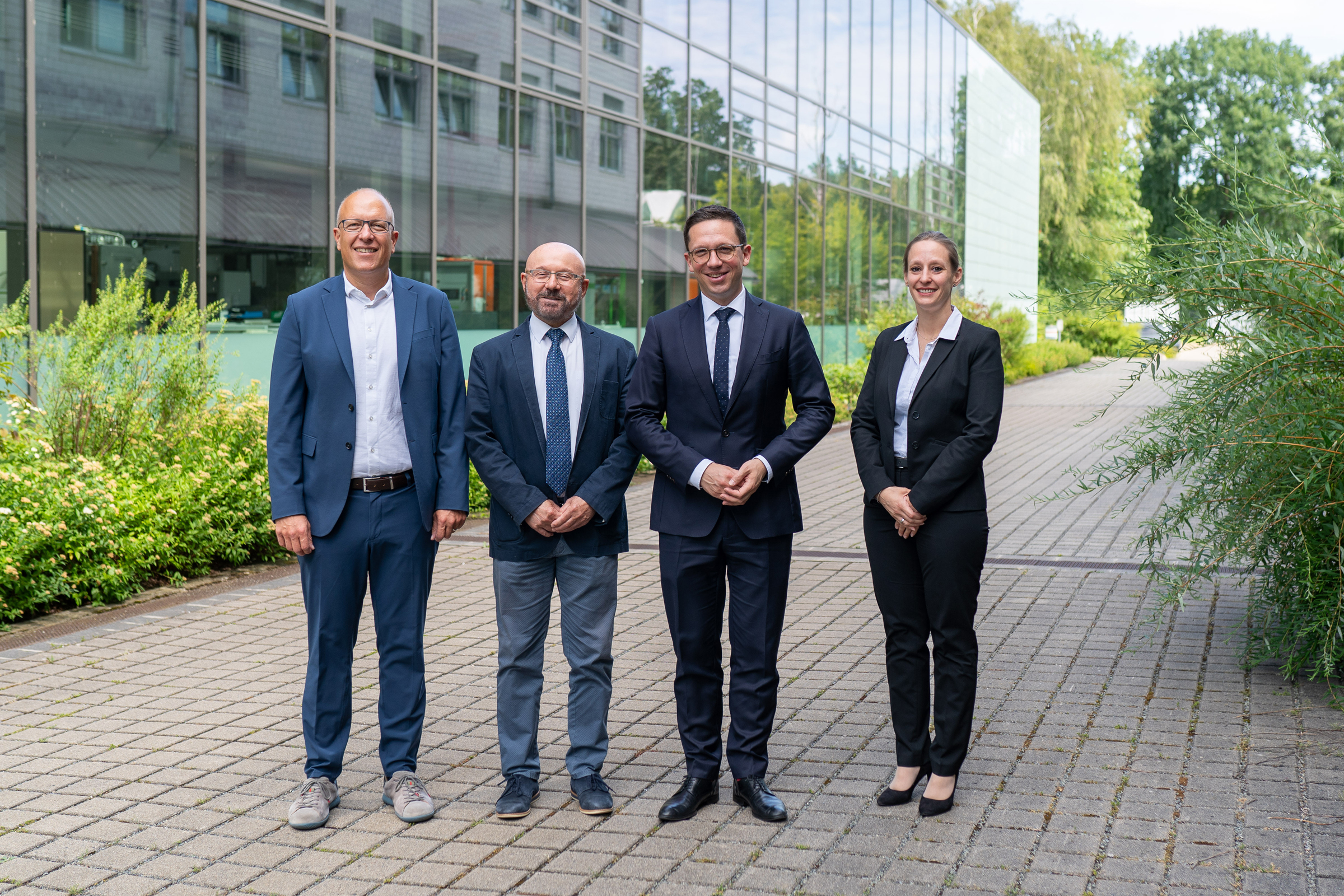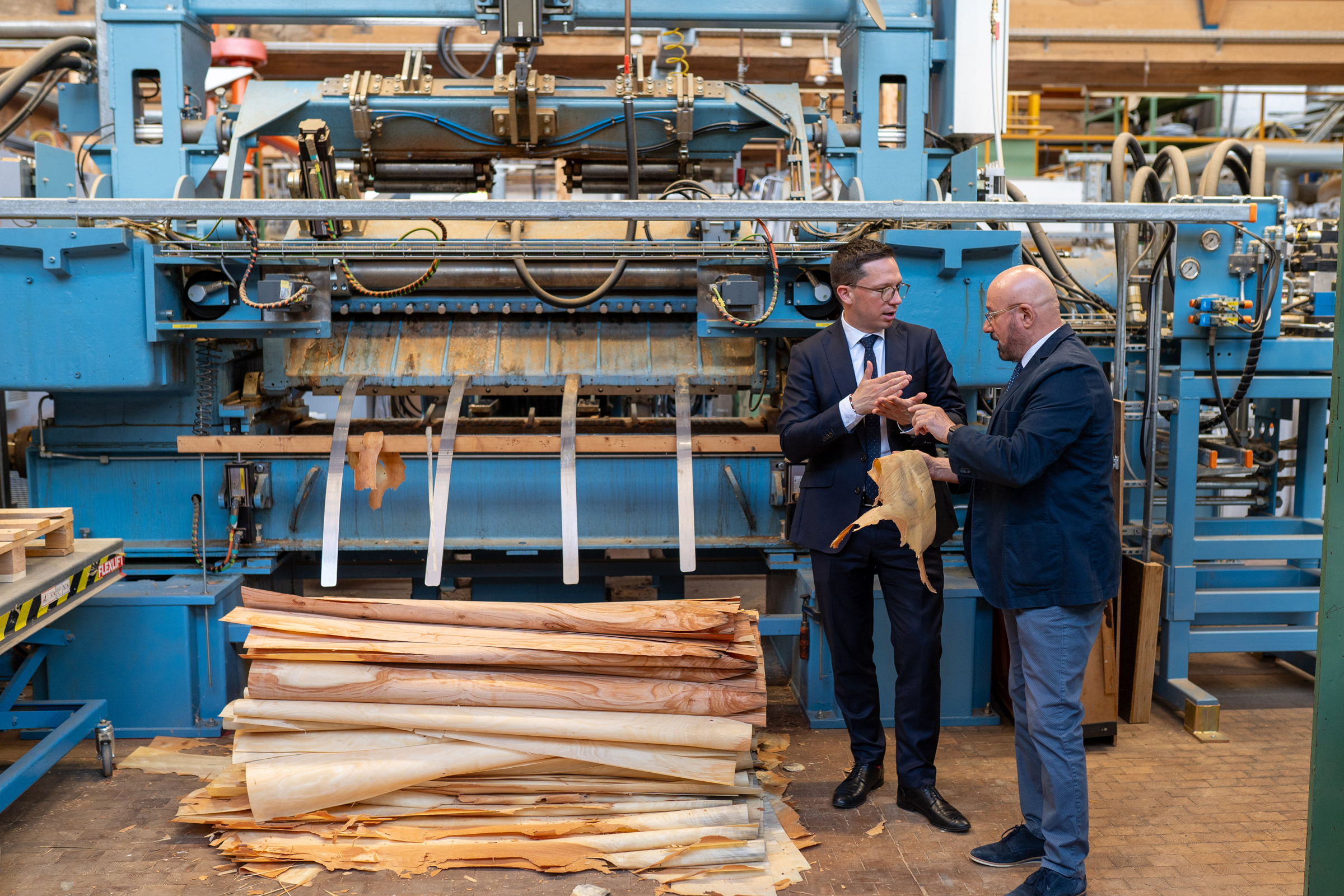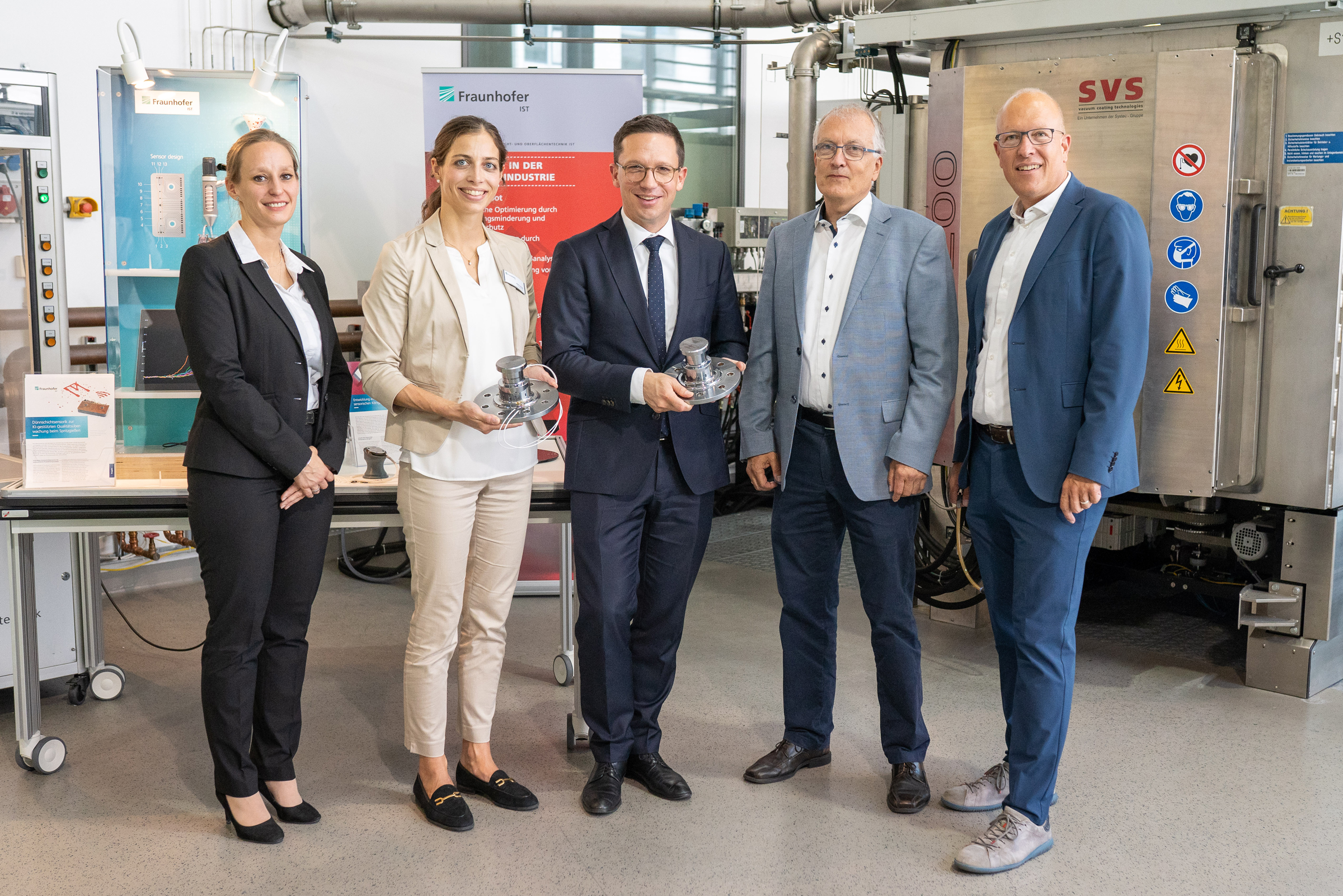Science Minister visits the Fraunhofer campus in Braunschweig
Within the framework of his summer tour, Lower Saxony’s Minister for Science and Culture, Falko Mohrs, visited the Fraunhofer institutes for Wood Research, Wilhelm-Klauditz-Institut WKI and for Surface Engineering and Thin Films IST in Braunschweig on the 8th of July 2024.

»These two Fraunhofer Institutes in Brunswick are impressive proof of the innovative strength and scientific expertise in the region. Renewable commodities and resource-saving production processes have huge potential to significantly advance our industries on their path to sustainability - and are therefore decisive factors for a successful future. It is exciting to get to know these developments at first hand«, says Falko Mohrs.
Tour of the Fraunhofer WKI
Building the future with renewable raw materials. Since 1946.
Minister Mohrs began his visit to the Fraunhofer campus in Braunschweig by taking a tour of the Fraunhofer WKI, which can look back on a long tradition of research into renewable raw materials. In the Technical Center of the Fraunhofer WKI, employees demonstrated research into veneer-based materials for applications in the construction and automotive industries. The Minister was given an insight into the efficient use of “trees of the future” such as pine as a lightweight material for load-bearing structures.

In addition, Minister Mohrs received information regarding the planned construction measures at the institute. A new Technical Center is being built on the Riedenkamp site. The ultra-modern test facility will replace the old Technical Center which dates from the 1960s. The new building offers sufficient space and modern technical equipment for research work on a semi-industrial scale. The future arrangement of the equipment and machines will make it possible to map the logical path of a material from raw resource through to finished product.
Furthermore, the Fraunhofer WKI is strategically investing around two million euros in a new laboratory for particle and fiber analysis. This will enable components of renewable raw materials to be better characterized for the development of new products and technologies. With the aid of wood-fiber pulping analysis, for example, the suitability of wood for utilization in classic and new materials can be verified. This paves the way for the increased use of renewable raw materials with high functional requirements such as vibration resistance, fire protection or electronic conductivity. Thanks to this key technology, material-intensive sectors such as the construction industry or the automotive industry could significantly improve their eco-balance and strengthen their market position.
The director of the Fraunhofer WKI, Professor Dr.-Ing. Bohumil Kasal, informed Minister Mohrs about the diverse possibilities of modern biomaterials during his tour of the old technical centre and emphasised the high strategic importance of the construction measures: “With our new Technical Center and the laboratory for particle and fiber analysis, we are laying the foundation for the technical facilities of the future. We are consolidating our position as the world’s leading institute for research into the utilization of renewable raw materials. Our range of services for the wood-based materials industry is thereby being expanded and, furthermore, we will be able to intensify our cooperation with other industries, such as vehicle construction.”
Tour of the Fraunhofer IST
Coatings and surfaces for sustainable products and production systems
At the neighboring Fraunhofer IST, Minister Mohrs was provided with information on the latest developments in coating and surface technology and sustainable technologies for production. “With our work, we address not only the technical but also the economic and ecological challenges of industrial production,” explained Institute Director Professor Dr.-Ing. Christoph Herrmann. “Through close cooperation with industrial partners and interdisciplinary research, in particular intense collaboration with the TU Braunschweig, we create innovative solutions that improve both the efficiency and the sustainability of production processes. The focus is thereby also on measures for decarbonization and the promotion of a circular economy.”

In the laboratory, Minister Mohrs was presented with an example of a technological innovation for the development and manufacture of precision optical parts and components, which are required for automated production processes across all industries. With the newly developed OptaX facility, double-sided optical coating of the highest precision can be realized for the first time.
The importance of thin-film sensor technology for mobility applications was demonstrated by IST employees by means of a kingpin. This component connects the cab unit and the trailer of a truck. Thin sensor layers were applied to the main load zones, with which the force can be measured directly; these results are then applied in order to compensate for the tensile or shear force in the trailer coupling. This is particularly decisive for electrically powered vehicles in order to optimize the interaction of the individual components such as the drive module and traction battery. As a result of the reduced load on the towing vehicle, energy consumption and CO2 emissions can be minimized.
The reduction of CO2 is also a key topic in the development of “Low Carbon Energy Technologies” at the Fraunhofer IST. The Deputy Director of the institute, Professor Dr.-Ing. Sabrina Zellmer, presented the Minister with the latest developments at the Fraunhofer IST in the field of batteries and fuel cells. Furthermore, she described the current status of the construction of the Fraunhofer Center for Energy Storage and Systems ZESS: “The three Fraunhofer institutes for Manufacturing Technology and Advanced Materials IFAM, for Surface Engineering and Thin Films IST, and for Ceramic Technologies and Systems IKTS are pooling their expertise at the Fraunhofer ZESS. The construction of the new research building in Braunschweig, which is funded by the federal government and the State of Lower Saxony, marks a strategic milestone for research into sustainable storage solutions in Lower Saxony.” The researchers are due to move into the new pilot plants and laboratories in 2025.
Last modified:
 Fraunhofer Institute for Wood Research
Fraunhofer Institute for Wood Research